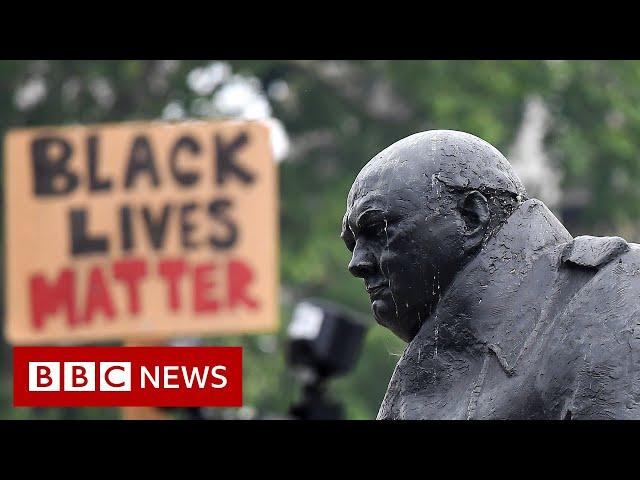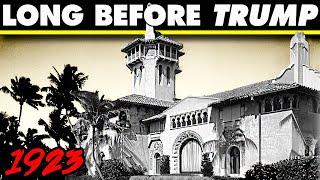
Churchill's legacy still painful for Indians - BBC News
Комментарии:

"Churchill's legacy still painful for Indians"... Are you suggesting the memory of mass murder should NOT be painful?
Ответить
He is nothing less than Hitler
Ответить
Maybe a little racism is not so bad.......
Ответить
Hitlers legacy still painful for jews 😩
Ответить
Churchill was way more evil than hitler
Ответить
# Genocide_in_India👇
We Indian never forget and never forgive whole scale genocide in India under British control. 170 million people died in 30 years.😔 Still we Indian stay to be in peace 🌍
🚩Jai Shree Krishna 🚩🙏

Are we just going to forget that Japan had just broken through Burma and was starting to get to India?
Ask the Chinese what Japanese occupation was like during ww2. Whatever the India people suffered by the British, the Japanese would have done 10x worse, if not more....

Winston Churchill was a hero. The Indians are always fighting amongst themselves
Ответить
"India was not governed by the British in 1943. Only the federal government with a limited set of duties and in control of the army were British responsibilities. Elected Indian legislators governed provinces that usually performed welfare and relief duties.
"These elected legislators running the Bengal government in 1943 did not ask for relief, did not declare the famine as a famine, and worked on the hunch that the food shortage was due to merchant speculators but did not test the hunch. Any biography of the key figures involved will tell us they did that not because the British told them to do it. They were not puppets. This was a democratic government, meaning that the politicians knew that their power flowed from the ballot, not the governor’s or Viceroy’s desks. The task of regulating markets had been devolved to this government and did not lie with London or Delhi. The British needed the Bengal politicians as much as they needed the British, Bengal being the eastern frontier of the War. It is not credible that Bengal politicians acted in fear. They did not act at all. For crucial months they were in denial. Most historians of the Bengal famine seem afraid of asking why Indian mentality proved so unhelpful in 1943.
"If their attitude is a puzzle, so is that of the provinces with plenty of food. There was no famine in most regions, and Punjab had a surplus. There may have been trading restrictions, but these could be negotiated. Why did interregional trade fail to rescue Bengal?"
. . .

Worse then hitler
Ответить
Attention Indians!
Re: "LearningThings-u2g"
The squeaky little mouse on here who identifies himself with a variety of names, the current one of which appears to be "LearningThings-u2g", is forever claiming that Churchill was somehow to blame for the Famine, and that the British somehow "looted" India to the tune of zillions of dollars.
I have - on a number of occasions - challenged him to provide at least some verifiable evidence to support his claims. So far, he has offered none.
If he fails to answer my challenge again, and responds as he usually does with a barrage of silly little schoolboy insults, then I will consider him to be defeated in this debate, and he will receive no further replies from me.
. . . . .

White supremacist Down Down.
Ответить
These two kids are self proclaimed genius, certifying each other.
They don't consider themselves to be expert on the subject matter as they always cite other experts.
And they don't even know, debate happens between two experts of subject matters but still they think they are in debate with people in the comment section.
For them those who align with their perspective is an expert and rest others are propagandist 👏 what a genius, Britain have produced.
These kids don't even know the difference between reality and perspective, they think their perspective is reality 😅
They might consider it as their winning in perspective battle (as they are genius they can think anything) but still they failed in reality and achieved no progress.
Btw, this is stayfoced if you two are confused.
Don't tempt me to reply you by commenting "We owned him, dust bite, etc" as this is going to be my all in one response, whatever you ask after this ,read this main comment again, it is my reply again.

Here is the truth of the Bengal Famine.
"It was initially caused by several poor years of harvest. The largest and therefore most important crop was the winter aman crop, which supplied 74% of the year's food. The aman crop of 1940 was exceptionally poor, and as a result food stocks were heavily drawn on in 1941. The crop of 1941 was adequate but not enough to replenish the stocks. The fall of Burma early in 1942 meant the loss of its rice exports to Bengal. As a result, exports from Bengal increased, as it sought to aid other areas. Imports to Bengal were too low to meet its needs, even before the Midnapore Cyclone hit in October, 1942. This cyclone destroyed some areas and caused severe damage to the aman crop due for harvest in December.
"The Indian Central Government had delegated powers to the provinces to control exports, and it was these provinces, in their anxiety to conserve their own resources, that refused to export surplus food to Bengal. The solution to this short-sighted selfishness would have been to centralise control, and to force those provinces with a surplus to export rice to Bengal. However, in March 1943, the Bengal Government demanded of the Indian Government that all barriers to trade be removed, and so a policy of de-control was instituted from May. This was an abject failure. The firm of Calcutta rice merchants that the Bengal Government tasked with buying rice for the Government made a good profit, but the stock it purchased was insufficient, and prices remained staggeringly high in Bengal. It was only in June, 1943 that this policy was reversed, and only at the end of August that alternative measures started to be taken.
"The Bengal Government was criticised by the Famine Inquiry Commission for several reasons. Firstly, they did not officially declare a famine early enough. This was the first stage in the Famine Code, a set procedure designed to help with famine relief. This failure was because they were trying to allay fears and create confidence, and the measures of the standard Code were felt to be inapplicable, as the situation in Bengal differed from those the Code was designed for. While this was correct, in that the Code would have had to be modified, a declaration would have triggered the appointment of a Famine Commissioner, who would have had far-reaching powers and responsibilities to deal with the famine more effectively. This only took place at the end of 1943, when it should have happened many months earlier.
"Secondly, there was a delay in starting full-scale relief measures. From the first months of 1943, local officers were reporting growing distress in many districts. However it was only in June, 1943 that the Bengal Government called for detailed information. Orders for relief efforts were not issued until August and the Famine Commissioner was not appointed until 26th September. It was September again before any large-scale distribution of food was begun.
"Thirdly, the Bengal Government failed to properly manage the stockpile and storage of supplies. From August to November, when the Army took charge of food movement, the Bengal Government failed to organise the arrival of large shipments of food into Calcutta and dispatch them to the districts. Stocks arriving in Calcutta were not properly identified on arrival, poor records were made, and appropriate staff were not appointed. The Government of India offered help in providing personnel, but the Bengal Government said this wasn’t needed. Storage was inadequate, and large stockpiles were stored in the open in the Royal Botanical Gardens, which caused sharp public opprobrium and some spoilage.
"Fourthly, while adequate stocks arrived in Calcutta, little of it reached the rural areas that were most at risk. Out of 206,000 tons that the Bengal government received, 141,000 tons were retained in Calcutta, while only 65,000 tons were sent out to the countryside. The Commission criticised the Bengal Government for allowing the business interests of Calcutta to outweigh the interests of saving the lives of the rural population.
"While the Commission saved most of their criticism for the Bengal Government, they also criticised the Indian Government for not recognising that the Bengal Government was failing to control the famine, and for not stepping in sooner. The Indian Government began to send large supply shipments in August, but it wasn’t until October that the new Viceroy, Lord Wavell, visited Bengal and the central Government stepped in to take more direct control of the administration of famine relief.
"With all of this in mind, the question must be asked as to how far Britain, and its Prime Minister, can be blamed for the failure to adequately deal with the famine in 1943. The Report does not mention anything that Britain should have done to alleviate the situation, and the measures introduced from October, 1943 seem to have begun to transform the situation. There appears to have been adequate food available elsewhere in India without the need for international relief shipments, and in the view of the Commission it was the failure of the Indian and Bengal Governments to enact these measures earlier and more effectively that was the cause of the catastrophic loss of life.
"Throughout those crucial early months from December 1942 to July, 1943, Suhrawardy, the minister responsible for food administration in the Bengal Government, was insisting to Delhi and London that the problem was one of hoarding, and that there were no food shortages in Bengal overall. This official position was disseminated to the Viceroy Lord Linlithgow in Delhi, and to the Secretary of State for India Leo Amery in London. The Bengal policies were primarily that of cracking down on hoarders and speculators.
"It was in early July when Suhrawardy claimed a ‘very great famine’. It was in mid-July that Lord Linlithgow changed his mind and started making demands for food imports as a matter of extreme urgency. Finally, Amery in London first claimed in a War Cabinet meeting in London on 31st July that there were food shortages unrelated to hoarding. This was the first that Churchill would have heard of this argument, and it ran counter to everything that Delhi and London had been told for more than half a year.
"The War Cabinet was cautious, but still the Minister for War Transport promised 50,000 tons of wheat from Australia, and 100,000 tons of Iraqi barley. But in early September the Minister advised Amery that he did not have enough ships for the transport of these grains. Therefore it was in a War Cabinet meeting on 24th September, with the December aman crop almost at harvest, that it was questioned whether other war-critical shipping should be diverted to relieve India. It was decided that it would not be possible to divert ships to deliver grain to India before this next harvest became available. The arguments being made by Amery were purely from a war standpoint, arguing that famine relief in Bengal was critical to the war effort.
"Was this decision of the War Cabinet on September 24th, 1943, actually responsible for exacerbating the famine? From 24th September to the harvest in December of the largest rice crop ever seen in Bengal, the Indian Government was starting to deal with the famine more effectively on their own. Food shipments from the Punjab and other areas were already arriving in Calcutta from the Indian Government from August. Would additional international grain shipments in those two months of October/November have made any difference, when the situation was already being turned around? The measures that are usually credited for alleviating the famine were those introduced by the new Viceroy Wavell, when he arrived in October. He brought in 15,000 soldiers and considerable army and RAF transport and staff to aid distribution, which transformed the situation considerably."
. . . .

Life of Saint Apollo and Saint Maurice is going well thanks to those 64 trillion dollars that their ancestors have looted.
Ответить
Egy gyilkos volt Churchil
Ответить
Fckn British B4S7ARDs
Ответить
Ah, this video. What a pile of pernicious, purblind and pathetic propaganda! It starts thus:
Indian Voice : "In a colony he once presided over . . . . "
-Deception, even before the first sentence has finished! Churchill never "presided over" Bengal. By Act of Parliament in 1935, Bengal had its own government at provincial level, which in turn was overseen by the Indian Central Government in Delhi. The prime minister of Bengal in 1943 was Sir Khawaja Nazimuddin. Churchill - who didn't become Prime Minister of Britain until 1940 - was 5,000 miles away, had no powers to direct any aspect of Bengal's internal affairs, and was in any case rather heavily occupied by an existential fight for the survival of European civilisation. Saying that he "presided over" Bengal is equivalent to saying he presided over Australia or Canada!
Well - there's one lump of bs exposed. I wonder if I'll find any more.
The agency responsible for food supply in Bengal in 1943 was the Bengal Provincial Government.
. . .

Winston Churchill, often glorified as a wartime hero, shares striking similarities with leaders like Hitler and Stalin due to his white supremacist ideology and imperialist policies that caused immense suffering, such as the Bengal Famine, which killed 3 million Bengalis. While Hitler's Aryan supremacy and Stalin's authoritarianism are rightly condemned, Churchill’s atrocities are downplayed simply because he was on the winning side of World War II. History, written by victors, often erases the horrors of European colonialism, including the displacement and genocide of Indigenous peoples in the Americas and Australia. To truly understand history, we must reject these biased narratives and hold all leaders accountable for their actions, regardless of their role in global conflicts.
Ответить
Churchill is in hell
Ответить
The UK drained $64.82 trillion from India during colonial rule between 1765 and 1900, with $33.8 trillion benefiting the wealthiest 10% - A new report by Oxfam International.
Guttermaster with Apollo mission will now try to disprove the new findings by using their small stagnant brain which haven't made any new neurons since 4 years i guess.
Poor guys.

A bloody racist imperialist....butcher.....He was more dangerous than Hitler......A typical pig....
Ответить
"A favourite trope of the [Hindu Fascist Nationalists] and their left-liberal white apologists has been the alleged infamy of Britain’s most cherished hero, Winston Churchill, charged with everything from mere racism to actual genocide. The worst accusation is that of deliberately starving four million Bengalis to death in the famine of 1943.
"The Famine took place at the height of World War Two, with the Japanese already occupying Burma and invading the British Indian province of Bengal, bombing its capital, Calcutta, and patrolling its coast with submarines.
"The famine raged for about six months, from the summer of 1943 until the end of that year, and estimates of its victims range from half a million upwards, depending on whether one includes its indirect and long-term effects. Most famine experts agree that famines can be caused by both nature and human agency, but never by any single individual. So how has a 67-year-old British prime minister in poor health, 5,000 miles away, fighting near-annihilation in a world war, come to be charged with causing such a cataclysmic disaster?
" The attempt to lay this at Churchill’s door stems from a sensationalist book by a Bengali-American journalist called Madhusree Mukerjee. As its title, Churchill’s Secret War, indicates, it was a largely conspiracist attempt to pin responsibility on distant Churchill for undoubted mistakes on the ground in Bengal.
"The actual evidence shows that Churchill believed, based on the information he had been getting, that there was no food supply shortage in Bengal, but a demand problem caused by local mismanagement of the distribution system. Ironically, his view found unexpected support in a 2010 exchange between Mukerjee and the Nobel Prize-winning economist Amartya Sen, the world’s foremost expert on famine in India.
"Commenting in the New York Times, Sen said of Mukerjee, that “she seems satisfied with little information” and that her data came from only two rice research stations, and those in only two out of 27 districts in Bengal. “The analysis I made,” countered Sen, “using data from all districts . . . indicated that food availability in 1943 (the famine year) was significantly higher than in 1941 (when there was no famine) . . . There was indeed a substantial shortfall compared with demand, hugely enhanced in a war economy . . . but that is quite different from a shortfall of supply compared with supply in previous years . . . Mukerjee seems to miss this crucial distinction, and in her single-minded . . . attempt to nail down Churchill, she ends up absolving British imperial policy of confusion and callousness.”
- Zareer Masani, Churchill and the Genocide Myth
. . .

😢😢Bengal famine
Ответить
There are two freakshows in the comments section who are constantsly barking that india was responsible for famines and british were greatest people on earth since thay helped indi,africa and sevral countries they invaded ...so give proofs cause its 4yrs of you morons and you still never get tired but waste our time...
Its said to not bark when you dont have balls to bite so get lost and A HAPPY NEW YEAR TO ALL

'Churchill is no better than Hitler' - Dr. Shashi Tharoor
Ответить
British were enslaved by Romans and their legacy is still painful to them now they try to lick the boots of Romans
Ответить
britian will decline more and more,people in this country is valueless
Ответить
Fat a** d**** Churchill and the Britishers
Ответить
😢😢 I hope hell exists for people like churchill...
Ответить
That's like saying that Hitler's legacy is still painful to the Jews. Churchill and Hitler were 2 sides of the same coin. Both were racists beyond imagination. Germans have learned from this part of their history. Britain has not. What would the world say if Germans voted that Hitler was the greatest German ever?
Ответить
CHURCHILL MURDERED 3 MILLION PEOPLE...BY STARVING THEM IN BENGAL... he is a mass murderer nothing less than Hitler...
Ответить
BBC is still painful for middle class Indians.
Ответить
Holocaust!!!
Ответить
As an Indian I will say this , I have nothing against Churchill , other Indians should learn to stop blaming him for everything
Ответить
Fuck britain
Ответить
Churchill was also responsible for the atrocity of the deaths of the Anzacs in WWI ,when he was Lord of the Admiralty , and ordered they storm the beaches of The Dardanelles .Only to be picked off like rabbits by the Turks . The arrogance of the British in those days meant they couldn’t care less about the lesser mortals of the colonies ,or those of colour ,or those who worked with their hands …because they believed the educated were so superior despite being helpless to look after themselves , eg: build their own houses ,hospitals, trains and railways ets. But had to get the working man to do it for him !!
Ответить
You should understand,the same way you judge Germany. NAZIS Hitler is Germany,, you should judge Britain and Churchill together.
In the Name of the crown Britain conquered the world.but when its comes to en end... than Sir so and so ist guilty...not Britain nono , no we are so serious...
1938 Churchill to Brüning...what we want is to destroy the german ecconomy. Churchill said ..not I ...we! Yes ,,,Napoleon,in my eyes a mass murder ,is also a heroe in Paris....

For millions Churchill maybe a hero but for billions he is a monster.
Ответить
They starved biafrans 2 million with gowon and awolowo
Ответить
Queen Victoria sat on her throne while a million Irish starved. Decades later Churchill sent the Black and Tans to Ireland.
Ответить
If they're so offended they should go back to India
Ответить
Every Indian feels in his heart that this man should have lived till now, when he would have known that these are the very Indians whom this man said could not be run and hated by the same Indians who are leaving his country behind and moving forward and becoming a world superpower. So emerging.
Ответить
There was peace under the Mughal Hindistan. Everyone prospered under Islamic rule. Today's India rules under capitalism and only the few elite can prosper. The majority will live as slaves to the system of capitalism. India must return to Islamic rule if everyone wants to prosper and live a high class life
Ответить
The Hitler of India
Ответить
Churchill killed more Indians than Adlof hitler killed Jews
Ответить
your estimates on death toll woefully low
Ответить


![2025년 2월 9일 발로란트 챔피언스 투어 퍼시픽 킥오프 우승 팀 DRX 단체 인터뷰(풀버전) [VCT 현장 인터뷰] 2025년 2월 9일 발로란트 챔피언스 투어 퍼시픽 킥오프 우승 팀 DRX 단체 인터뷰(풀버전) [VCT 현장 인터뷰]](https://ruvideo.cc/img/upload/azFOeGdTSUt1RHQ.jpg)






















